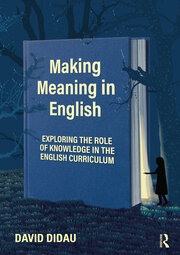Making Meaning in English
Books about English as a subject aren’t published very often, so it’s particularly welcome that David Didau, one of the sharpest and most accessible writers on education today in books like Making Kids Cleverer: A Manifesto for Closing the Advantage Gap, has turned his attention to his own subject.
Making Meaning in English: exploring the role of knowledge in the English curriculum sets out to think deeply about the body of knowledge that English might encompass:
Unlike most other school subjects English does not consist of an agreed, settled body of knowledge. We take our guidance from examination boards. We dwell on the detailed knowledge of a very few canonical texts and attempt to teach and assess a generic set of skills in the forlorn hope that this will equip young people for the vicissitudes they will face in life.
David Didau opens with an overview of the development of the subject in the English education system. What strikes me as a teacher in Ireland is that our neighbours have thought a lot about the subject over the years, whereas there is little enough equivalent here to the writing by people like David Holbrook and Peter Abbs (subject of my teacher diploma thesis, and who recently died) and more ‘official’ document like the Newbolt Report (1921), the Bullock Report (A Language for Life, 1975) and the Ofsted Reports between 2009 and 2012 that Didau examines.
I’d be delighted if anyone can point me to a thoughtful analysis of the subject as it has been taught in Ireland over decades, but suspect I won’t get any responses. There is little enough intellectual underpinning of the subject here. Secondary schools just passively receive exam-based text lists and thinly thought-out language teaching sequences (in evidence: the feeble skills-based oral Classroom-Based Assessment in second year Junior Cycle, which allows pupils to speak on Lionel Messi rather than insisting on someone connected with English - say, Maya Angelou). Text-lists are sometimes good, sometimes disappointing, but with no clear driving rationale.
David Didau’s purpose in Making Meaning in English is both to give a sense of what English is for, and (mostly in the second half of the book), some practical approaches to matters like metaphor, grammar, argument and pattern:
If English should be for passing on a body of knowledge - and I think it should - we need to think more deeply and critically about what this knowledge should be. Unlike most other school subjects English does not consist of an agreed, settled body of knowledge.
This feeds through to individual teachers and to individual schools in a lack of confidence, both in what is being taught and how:
English has become a folk discipline with craft knowledge passed down in individual departments … a great deal of poorly understood and ill-thought through ideas continue to be passed off as ‘best practice’, and many ideas are lost or forgotten.
Chapter 2, ‘Problems in English’, hits many nails on the head, including: a lack of clarity on the purpose of marking work (or ‘corrections’ as they are too-often called here); a ‘skills-based subject assumption … because English is made up of transferable disciplinary skills it doesn’t much matter what students read or write about’; the ‘history lesson problem’ (the front-loading of context without sufficient ability to use this judiciously); and ‘the problem with knowledge organisers’. I share Didau’s concerns about the latter, which need to be constructed with a great deal of skill: too often they are reductive or even counter-productive.
I particularly liked Chapter 4, ‘Noticing and Analogising’, which opens with words by the philosopher Michael Oakeshott, whose
view of English as requiring ‘exact attention’ and ‘analogical understandings’ provides a way through the thicket of exam technique and assessment objectives that blight much of what the study of English has become.
Look at pages 92 to 97 for Didau’s explanation of what he understands by ‘noticing’ (a close cousin to ‘attention’), including a helpful list on page 96 of what ‘novices’ might look out for, including motif-recurrence, arresting metaphors and alterations in narrative perspective. He demonstrates this in an analysis of the first sentence of E.M. Forster’s A Passage to India, quoting Terry Eagleton (whose lectures I once attended - terrific). That intense level of ‘noticing’ is evident in two books I have recently been reading and can recommend, Suppose a Sentence by Brian Dillon and A Swim in a Pond in the Rain: In Which Four Russians Give a Master Class on Writing, Reading, and Life by George Saunders.
The second half of the book covers ground which will be well-known to experienced English teachers, but helpful to those less familiar with the ideas behind metaphor, narrative structure, grammar (a notorious breeding ground for ill-tempered and ill-informed arguments) and more.
In the concluding pages, Didau turns his attention to ‘Connecting the curriculum’ in matters like hierarchical and cumulative sequencing of texts. Again, in the Irish context this just has not been done. Individual schools have a limited ability to construct the kind of coherent curriculum sequence he describes in Chapter 12, ‘Into Action’.
Every English teacher in these islands (and further, no doubt) should read this book: it is thoughtful, well-informed and tightly-reasoned. It is driven by the impulses that sent us all into teaching in the first place: a love for our subject, and a desire for young people to share its joys.
(END)
[Go here for some online resources associated with the book, such as a sonnet anthology and an impressive unit on Julius Caesar and rhetoric].
More books of interest on English as a subject, and how to teach it, here.
